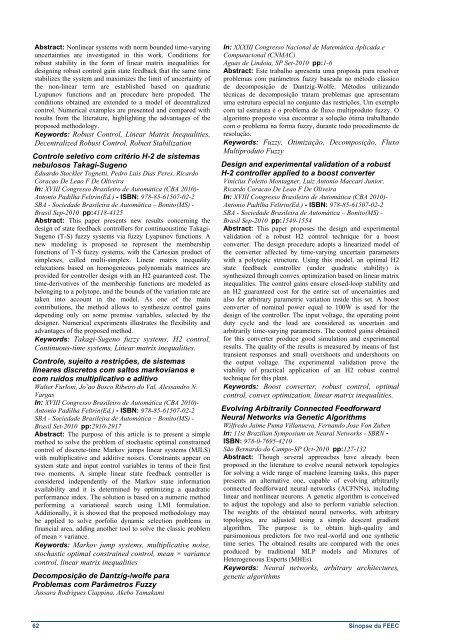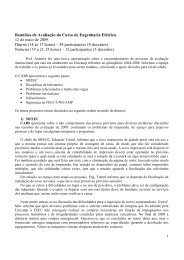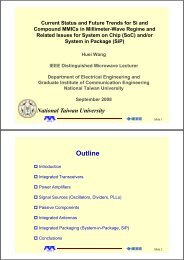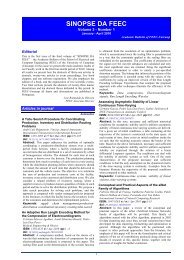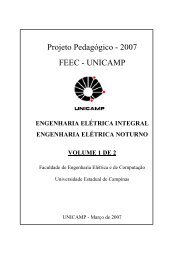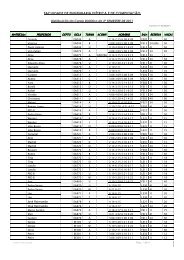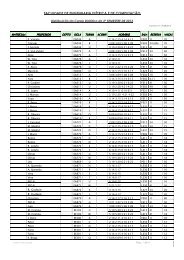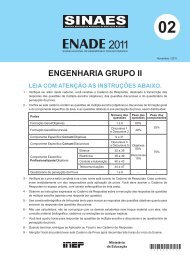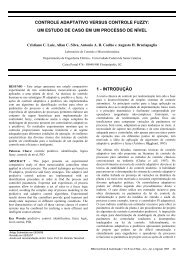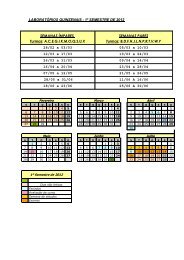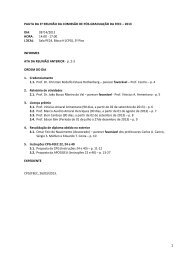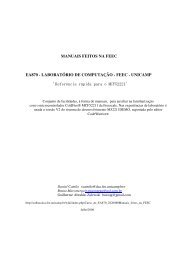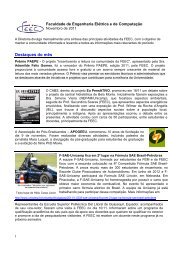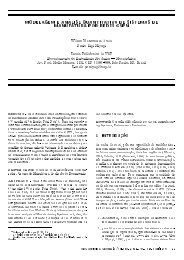sinopseV3n3.pdf - FEEC - Unicamp
sinopseV3n3.pdf - FEEC - Unicamp
sinopseV3n3.pdf - FEEC - Unicamp
You also want an ePaper? Increase the reach of your titles
YUMPU automatically turns print PDFs into web optimized ePapers that Google loves.
Abstract: Nonlinear systems with norm bounded time-varying<br />
uncertainties are investigated in this work. Conditions for<br />
robust stability in the form of linear matrix inequalities for<br />
designing robust control gain state feedback that the same time<br />
stabilizes the system and maximizes the limit of uncertainty of<br />
the non-linear term are established based on quadratic<br />
Lyapunov functions and an procedure here propoded. The<br />
conditions obtained are extended to a model of decentralized<br />
control. Numerical examples are presented and compared with<br />
results from the literature, highlighting the advantages of the<br />
proposed methodology.<br />
Keywords: Robust Control, Linear Matrix Inequalities,<br />
Decentralized Robust Control, Robust Stabilization<br />
Controle seletivo com critério H-2 de sistemas<br />
nebulosos Takagi-Sugeno<br />
Eduardo Stockler Tognetti, Pedro Luis Dias Peres, Ricardo<br />
Coracao De Leao F De Oliveira<br />
In: XVIII Congresso Brasileiro de Automática (CBA 2010)-<br />
Antonio Padilha Feltrin(Ed.) - ISBN: 978-85-61507-02-2<br />
SBA - Sociedade Brasileira de Automática – Bonito(MS) -<br />
Brasil Sep-2010 pp:4118-4125<br />
Abstract: This paper presents new results concerning the<br />
design of state feedback controllers for continuoustime Takagi-<br />
Sugeno (T-S) fuzzy systems via fuzzy Lyapunov functions. A<br />
new modeling is proposed to represent the membership<br />
functions of T-S fuzzy systems, with the Cartesian product of<br />
simplexes, called multi-simplex. Linear matrix inequality<br />
relaxations based on homogeneous polynomials matrices are<br />
provided for controller design with an H2 guaranteed cost. The<br />
time-derivatives of the membership functions are modeled as<br />
belonging to a polytope, and the bounds of the variation rate are<br />
taken into account in the model. As one of the main<br />
contributions, the method allows to synthesize control gains<br />
depending only on some premise variables, selected by the<br />
designer. Numerical experiments illustrates the flexibility and<br />
advantages of the proposed method.<br />
Keywords: Takagi-Sugeno fuzzy systems, H2 control,<br />
Continuous-time systems, Linear matrix inequalities.<br />
Controle, sujeito a restrições, de sistemas<br />
lineares discretos com saltos markovianos e<br />
com ruídos multiplicativo e aditivo<br />
Walter Furloni, Jo˜ao Bosco Ribeiro do Val, Alessandro N.<br />
Vargas<br />
In: XVIII Congresso Brasileiro de Automática (CBA 2010)-<br />
Antonio Padilha Feltrin(Ed.) - ISBN: 978-85-61507-02-2<br />
SBA - Sociedade Brasileira de Automática – Bonito(MS) -<br />
Brasil Set-2010 pp:2910-2917<br />
Abstract: The purpose of this article is to present a simple<br />
method to solve the problem of stochastic optimal constrained<br />
control of discrete-time Markov jumps linear systems (MJLS)<br />
with multiplicative and additive noises. Constraints appear on<br />
system state and input control variables in terms of their first<br />
two moments. A simple linear state feedback controller is<br />
considered independently of the Markov state information<br />
availability and it is determined by optimizing a quadratic<br />
performance index. The solution is based on a numeric method<br />
performing a variational search using LMI formulation.<br />
Additionally, it is showed that the proposed methodology may<br />
be applied to solve porfolio dynamic selection problems in<br />
financial area, adding another tool to solve the classic problem<br />
of mean × variance.<br />
Keywords: Markov jump systems, multiplicative noise,<br />
stochastic optimal constrained control, mean × variance<br />
control, linear matrix inequalities<br />
Decomposição de Dantzig-/wolfe para<br />
Problemas com Parâmetros Fuzzy<br />
Jussara Rodrigues Ciappina, Akebo Yamakami<br />
In: XXXIII Congresso Nacional de Matemática Aplicada e<br />
Computacional (CNMAC)<br />
Aguas de Lindoia, SP Set-2010 pp:1-6<br />
Abstract: Este trabalho apresenta uma proposta para resolver<br />
problemas com parâmetros fuzzy baseada no método clássico<br />
de decomposição de Dantzig-Wolfe. Métodos utilizando<br />
técnicas de decomposição tratam problemas que apresentam<br />
uma estrutura especial no conjunto das restrições. Um exemplo<br />
com tal estrutura é o problema de fluxo multiproduto fuzzy. O<br />
algoritmo proposto visa encontrar a solução ótima trabalhando<br />
com o problema na forma fuzzy, durante todo procedimento de<br />
resolução.<br />
Keywords: Fuzzy, Otimização, Decomposição, Fluxo<br />
Multiproduto Fuzzy<br />
Design and experimental validation of a robust<br />
H-2 controller applied to a boost converter<br />
Vinícius Foletto Montagner, Luiz Antonio Maccari Junior,<br />
Ricardo Coracao De Leao F De Oliveira<br />
In: XVIII Congresso Brasileiro de Automática (CBA 2010)-<br />
Antonio Padilha Feltrin(Ed.) - ISBN: 978-85-61507-02-2<br />
SBA - Sociedade Brasileira de Automática – Bonito(MS) -<br />
Brasil Sep-2010 pp:1549-1554<br />
Abstract: This paper proposes the design and experimental<br />
validation of a robust H2 control technique for a boost<br />
converter. The design procedure adopts a linearized model of<br />
the converter affected by time-varying uncertain parameters<br />
with a polytopic structure. Using this model, an optimal H2<br />
state feedback controller (under quadratic stability) is<br />
synthesized through convex optimization based on linear matrix<br />
inequalities. The control gains ensure closed-loop stability and<br />
an H2 guaranteed cost for the entire set of uncertainties and<br />
also for arbitrary parametric variation inside this set. A boost<br />
converter of nominal power equal to 100W is used for the<br />
design of the controller. The input voltage, the operating point<br />
duty cycle and the load are considered as uncertain and<br />
arbitrarily time-varying parameters. The control gains obtained<br />
for this converter produce good simulation and experimental<br />
results. The quality of the results is measured by means of fast<br />
transient responses and small overshoots and undershoots on<br />
the output voltage. The experimental validation prove the<br />
viability of practical application of an H2 robust control<br />
technique for this plant.<br />
Keywords: Boost converter, robust control, optimal<br />
control, convex optimization, linear matrix inequalities.<br />
Evolving Arbitrarily Connected Feedforward<br />
Neural Networks via Genetic Algorithms<br />
Wilfredo Jaime Puma Villanueva, Fernando Jose Von Zuben<br />
In: 11st Brazilian Symposium on Neural Networks - SBRN -<br />
ISBN: 978-0-7695-4210<br />
São Bernardo do Campo-SP Oct-2010 pp:127-132<br />
Abstract: Though several approaches have already been<br />
proposed in the literature to evolve neural network topologies<br />
for solving a wide range of machine learning tasks, this paper<br />
presents an alternative one, capable of evolving arbitrarily<br />
connected feedforward neural networks (ACFNNs), including<br />
linear and nonlinear neurons. A genetic algorithm is conceived<br />
to adjust the topology and also to perform variable selection.<br />
The weights of the obtained neural networks, with arbitrary<br />
topologies, are adjusted using a simple descent gradient<br />
algorithm. The purpose is to obtain high-quality and<br />
parsimonious predictors for two real-world and one synthetic<br />
time series. The obtained results are compared with the ones<br />
produced by traditional MLP models and Mixtures of<br />
Heterogeneous Experts (MHEs).<br />
Keywords: Neural networks, arbitrary architectures,<br />
genetic algorithms<br />
62 Sinopse da <strong>FEEC</strong>


